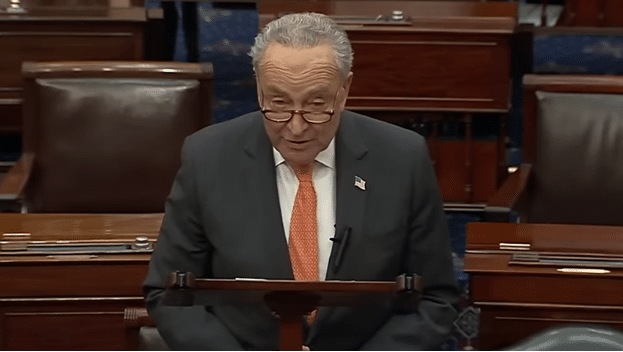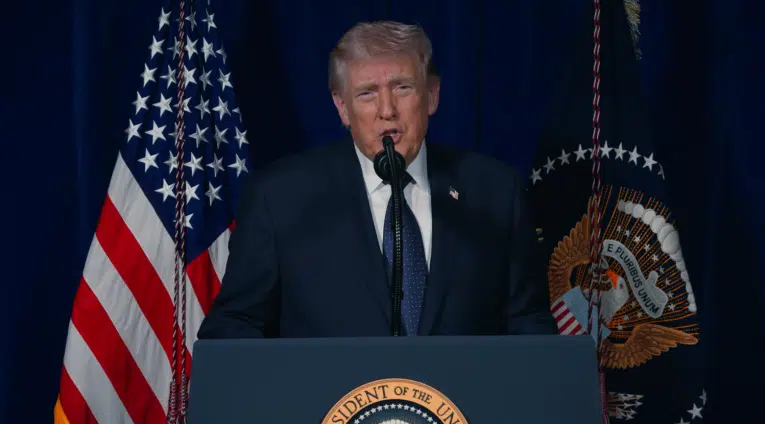
For the second consecutive month, both consumer and producer prices slowed down, according to data compiled by the Bureau of Labor Statistics, to 2.3 percent and 2.4 percent annually in April, respectively.
This despite President Donald Trump’s levying of tariffs since the beginning of his second term that began on January 20. That included the fentanyl and border security tariffs slapped on Mexico, Canada and China on Feb. 1. Also, the Section 232 aluminum tariffs enacted on Feb. 11 and the steel tariffs on Feb. 10. Not to mention the global reciprocal tariffs put into effect on April 2 that have been lowered to a general 10 percent whilst trade negotiations play out.
The entire time, opponents of President Trump’s tariffs were promising there would be higher prices and more inflation.
On March 2, Senate Minority Leader Chuck Schumer (D-N.Y.) boldly predicted, “President Trump’s tariffs are going to raise prices on families by as much as $1,200 per year.”
On March 11, Schumer declared, “inflation has gone up under Donald Trump, from groceries to retail to cars.”
On Feb. 1, House Minority Leader Hakeem Jeffries (D-N.Y.) similarly suggested that prices would go up, stating, “The tariffs imposed by the administration and strongly supported by House Republicans will not lower the high cost of living for everyday Americans. Instead, it will likely do the exact opposite and make life more expensive.”
On March 3, Sen. Elizabeth Warren (D-Mass.) also projected price hikes, saying, “Donald Trump promised on ‘Day 1’ to lower costs, but instead working families now have to worry about giant corporations using his haphazard tariff announcements as an excuse to raise prices – and the Trump Administration has no plan to stop it.”
Mind you, all of these predictions were made prior to the April 2 announcement of global reciprocal tariffs.
But none of that was right. In April, on the consumer side, food at home was down 0.1 percent, food away from home was down 0.4 percent, gasoline was down 0.1 percent, fuel oil was down 1.3 percent, apparel down 0.2 percent, new vehicles were unchanged and used cars and trucks down 0.5 percent.
On the producer side, foods were down another 1 percent, energy down 0.4 percent, trade down 1.6 percent, transportation and warehousing down 0.4 percent and other services were down 0.3 percent.
So, it was just a complete miss in terms of expectations and the gloomy predictions made by the President’s opponents. Hey, you win some, and you lose some. It’s actually good news for the American people, so let’s call this a win.
Part of the equation could have to do with the timing of Trump’s tariff announcements coming during a quarter where economic activity was already slowing down with the first quarter Gross Domestic Product (GDP), where inflation-adjusted growth shrank a bit by 0.3 percent, and when prices were already dropping as demand cooled.
In other words, the tariff announcements coming at a time when inflation expectations were falling were not enough to overturn those expectations. Now, with the reciprocal tariffs effectively paused for next few months while negotiations are ongoing, Democrats’ predictions are all the more dubious.
Another exigent circumstance that Democrats were not foreseeing at the time of their ill-fated predictions was the Organization of the Petroleum Exporting Countries (OPEC) increasing oil production significantly with an announcement on April 3 for an addition 441,000 barrels per day in June.
Which is the other way to decrease prices, which is to increase production and supplies.
But for the tell, all other countries utilize tariffs as well, but they haves still been cutting interest rates at the central bank level, indicating an emerging global consensus for lower growth and inflation expectations more generally.
As far as it goes, consumer prices’ growth is at its lowest level since February 2021, which is much-needed relief for the American people and is unquestionably good news. More good news is that the tariffs have not yet produced the price increases that were predicted by the Democratic doomsayers. And thanks to the ongoing reciprocal trade negotiations scoring deals with the United Kingdom and China, they may never. Will Democrats admit they were wrong?
Robert Romano is the Executive Director at Americans for Limited Government Foundation.






